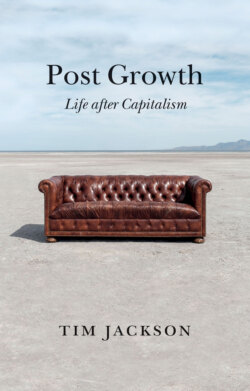Читать книгу Post Growth - Tim Jackson - Страница 12
Backstory
ОглавлениеI’ve long been fascinated by that day in Kansas, particularly after a live recording of the University of Kansas speech was unearthed from a basement some twenty years ago. It elicited a frisson of historical excitement in what was still a marginalized debate. In the intervening years, I began to take its existence for granted. RFK’s words became just a part of the everyday vocabulary used by those critical of economic growth or of the instruments we use to measure it.
Increasingly, though, I found myself wondering about the source of his ideas. How did a postgrowth critique find its way into a Presidential campaign speech at that time and in that place? What motivated that man in that moment to take such a counter-cultural position in what must have seemed quite an arcane debate? Perhaps in finding out, I would begin to understand why it has taken more than half a century for the ideas themselves to be taken even remotely seriously. And why they are still for the most part neglected.
In an event marking the fiftieth anniversary of the speech, I happened to share a conference platform with Kerry Kennedy, the founder of the RFK Human Rights Foundation and Bobby Kennedy’s daughter. I was keen to find out if she knew anything more about the origins of his concern over economic growth than I did. But she’d just been a child when her father was in Kansas. And though her life’s work had continued his legacy, campaigning for human rights, the particularities of the GDP were an unfamiliar terrain. She hadn’t known of the significance of that speech until our event together, she told me.
Crucially, though, our conversation led me to the testimony of Adam Walinsky, who was immediately receptive to my hunger for more insight. He was also quite clear that he personally wasn’t the source of the ideas. The content always came from the man himself. ‘I wrote them, I picked the words,’ he said. ‘But it was RFK who picked all the examples: they were issues he had been talking about since we got to the Senate. So the entire speech is really about the country he wanted us to be. It was about his vision of America and of what we should aspire to be.’
A little further investigation uncovered two critical links in the intellectual backstory. One was to the mid-twentieth-century American liberalism that was beginning to explore the discontents of a society built on consumerism. The other was to the astonishing impact achieved by Rachel Carson’s Silent Spring. Published in 1962, that one book has long been credited with single-handedly kickstarting the modern environmental movement. It certainly influenced the Kennedys. Bobby’s brother President John F. Kennedy had supported Carson throughout the writing of the book and publicly endorsed her work against fierce opposition from industry when it first appeared in public.
The ‘burgeoning environmentalism’ of JFK’s administration was firmly established in a speech made by one of his close advisers during the successful 1960 election campaign, the Supreme Court Justice William O. Douglas. Bobby Kennedy and Douglas had been friends since the 1950s. They had hiked together in the wilderness. RFK’s love of nature was born in part at least from his familiarity with it. Douglas was a willing ally in the struggle to build a more ecological polity. ‘The preservation of values which technology will destroy . . . is indeed the new frontier,’ he declared at a Wilderness Conference in San Francisco.13
That sentiment was echoed by the American liberals. Two intellectual figures towered over others in the emerging debate. (One of them quite literally: the economist John Kenneth Galbraith was 6 foot 9 inches tall.) Galbraith had written scathingly about the dubious rewards of consumerism. In the most widely cited passage in his bestseller book on The Affluent Society (1958), he wrote:
The family which takes its mauve and cerise, air-conditioned, power-steered, and power-braked automobile out for a tour passes through cities that are badly paved, made hideous by litter, blighted buildings, billboards, and posts for wire that should long since have been put underground.14
His Harvard colleague and one-time neighbour Arthur Schlesinger had written in a very similar vein about the obscenity of conspicuous wealth amidst rising public squalor. In a pamphlet on The Future of Liberalism written in 1956, he complained that:
Consumer goods of ever-increasing ingenuity and luxuriance pour out of our ears, but our schools become more crowded and dilapidated, our teachers more weary and underpaid, our playgrounds more crowded, our cities dirtier, our roads more teeming and filthy, our national parks more unkempt, our law enforcement more overworked and inadequate.15
Both men became advisers to the Kennedys during JFK’s administration. The groundwork for a critique of the GDP had been laid by two important cultural conversations of the time, both of them critical of the American dream, one for social and the other for environmental reasons. But at the end of the day, the inspiration for Bobby Kennedy’s speech at the University of Kansas remains a product of one man’s experience, insight and sentiment. Perhaps it stands no more in need of explanation than that.
